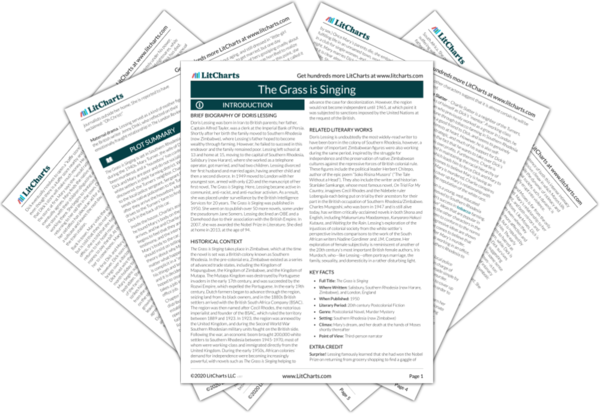Brief Biography of Doris Lessing
Doris Lessing was born in Iran to British parents; her father, Captain Alfred Tayler, was a clerk at the Imperial Bank of Persia. Shortly after her birth the family moved to Southern Rhodesia (now Zimbabwe), where Lessing’s father hoped to become wealthy through farming. However, he failed to succeed in this endeavor and the family remained poor. Lessing left school at 13 and home at 15, moving to the capital of Southern Rhodesia, Salisbury (now Harare), where she worked as a telephone operator, got married, and had two children. Lessing divorced her first husband and married again, having another child and then a second divorce. In 1949 moved to London with her youngest son, armed with only £20 and the manuscript of her first novel, The Grass is Singing. Here, Lessing became active in communist, anti-racist, and anti-nuclear activism. As a result, she was placed under surveillance by the British Intelligence Services for 20 years. The Grass is Singing was published in 1950. She went on to publish over 50 more novels, some under the pseudonym Jane Somers. Lessing declined an OBE and a Damehood due to their association with the British Empire. In 2007, she was awarded the Nobel Prize in Literature. She died at home in 2013, at the age of 94.
Historical Context of The Grass is Singing
The Grass is Singing takes place in Zimbabwe, which at the time the novel is set was a British colony known as Southern Rhodesia. In the pre-colonial era, Zimbabwe existed as a series of advanced trade states, including the Kingdom of Mapungubwe, the Kingdom of Zimbabwe, and the Kingdom of Mutapa. The Mutapa Kingdom was destroyed by Portuguese invaders in the early 17th century, and was succeeded by the Rozwi Empire, which expelled the Portuguese. In the early 19th century, Dutch farmers began to advance through the region, seizing land from its black owners, and in the 1880s British settlers arrived with the British South Africa Company (BSAC). The region was then named after Cecil Rhodes, the notorious imperialist and founder of the BSAC, which ruled the territory between 1889 and 1923. In 1923, the region was annexed by the United Kingdom, and during the Second World War Southern Rhodesian military units fought on the British side. Following the war, an economic boom brought 200,000 white settlers to Southern Rhodesia between 1945-1970, most of whom were working-class and immigrated directly from the United Kingdom. During the early 1950s, African colonies’ demand for independence were becoming increasingly powerful, with novels such as The Grass is Singing helping to advance the case for decolonization. However, the region would not become independent until 1965, at which point it was subjected to sanctions imposed by the United Nations at the request of the British.
Other Books Related to The Grass is Singing
Doris Lessing is undoubtedly the most widely-read writer to have been born in the colony of Southern Rhodesia, however, a number of important Zimbabwean figures were also working during the same period, inspired by the struggle for independence and the preservation of native Zimbabwean cultures against the repressive forces of British colonial rule. These figures include the political leader Herbert Chitepo, author of the epic poem “Soko Risina Musoro” (“The Tale Without a Head”). They also include the writer and historian Stanlake Samkange, whose most famous novel, On Trial For My Country, imagines Cecil Rhodes and the Ndebele ruler Lobengula each being put on trial by their ancestors for their part in the British occupation of Southern Rhodesia/Zimbabwe. Charles Mungoshi, who was born in 1947 and is still alive today, has written critically-acclaimed novels in both Shona and English, including Makunun'unu Maodzamoyo, Kunyarara Hakusi Kutaura, and Waiting for the Rain. Lessing’s exploration of the injustices of colonial society from the white settler’s perspective invites comparisons to the work of the South African writers Nadine Gordimer and J.M. Coetzee. Her exploration of female subjectivity is reminiscent of another of the 20th century’s most important British female authors, Iris Murdoch, who—like Lessing—often portrays marriage, the family, sexuality, and domesticity in a rather disturbing light.
Key Facts about The Grass is Singing
-
Full Title: The Grass is Singing
-
Where Written: Salisbury, Southern Rhodesia (now Harare, Zimbabwe), and London, England
-
When Published: 1950
-
Literary Period: 20th century Postcolonial Fiction
-
Genre: Postcolonial Novel, Murder Mystery
-
Setting: Southern Rhodesia (now Zimbabwe)
-
Climax: Mary’s dream, and her death at the hands of Moses shortly thereafter
-
Point of View: Third-person narrator
Extra Credit for The Grass is Singing
